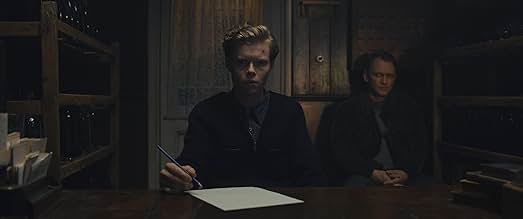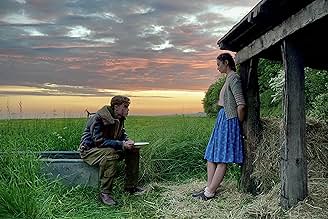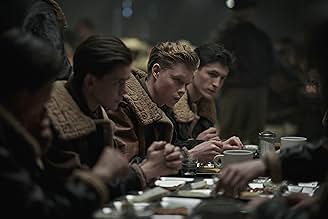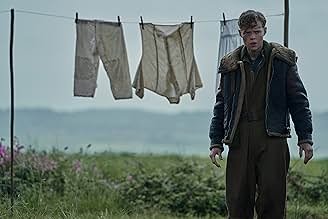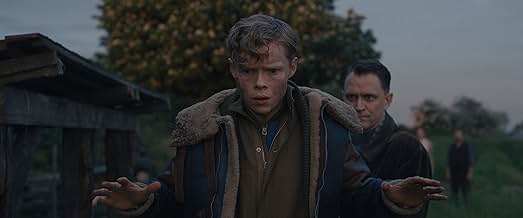Cinco millas sobre el suelo y detrás de las líneas enemigas, once hombres dentro de un bombardero conocido como "Fortaleza Voladora" luchan contra bandadas de cazas alemanes.Cinco millas sobre el suelo y detrás de las líneas enemigas, once hombres dentro de un bombardero conocido como "Fortaleza Voladora" luchan contra bandadas de cazas alemanes.Cinco millas sobre el suelo y detrás de las líneas enemigas, once hombres dentro de un bombardero conocido como "Fortaleza Voladora" luchan contra bandadas de cazas alemanes.
- Ganó 1 premio Primetime Emmy
- 7 premios y 25 nominaciones en total
Explorar episodios
Reseñas destacadas
This show was beautiful and heartbreaking.
The costumes were prefect.
All the actors were so professional and believeable, it was easy to forget I was watching a show.
I got sucked in and didn't come back out until it was over and then I watched it two more times.
The depiction of what the men went through was astounding.
The action scenes were so intense I could feel it in my chest.
They were gut wrenching and horrific.
I could never have imagine how terrifying it must have been for the men who really went through this.
It was a beautiful honor and tribute to the Airforce Men, who fought and died, in World War II.
The costumes were prefect.
All the actors were so professional and believeable, it was easy to forget I was watching a show.
I got sucked in and didn't come back out until it was over and then I watched it two more times.
The depiction of what the men went through was astounding.
The action scenes were so intense I could feel it in my chest.
They were gut wrenching and horrific.
I could never have imagine how terrifying it must have been for the men who really went through this.
It was a beautiful honor and tribute to the Airforce Men, who fought and died, in World War II.
Let me start off by saying I really enjoyed the series, it was really quite good. The acting is good, the sets and costumes and characters are phenomenal. I feel like they really show you the horrors of war. Certainly some of the best depiction of aerial Combat I've seen (I can't test to its accuracy but it certainly kept me at the edge of my seat). But it should have been better and ultimately it's nothing I haven't seen before in other World War II films and series. That being said this is top caliber.
The main con being that so many characters come in and come out of the series that it's hard to get attached to many of the newer ones, even though large parts of the stories are built around them. I understand that they were trying to be somewhat historically accurate and that's why they kept bringing a new characters, but it just got hard to tell who was who and even when I couldn't remember peoples names, I didn't feel too much for them because I only know them for a few episodes. Also, this is really nitpicky, but the opening tile sequence is a little much. I always say Apple TV has some of the coolest tile sequences for their shows, this one was boring and cliché, and it really shows just how highly the show thought of itself.
All in all, if someone told me then you very about World War II and wanted to watch a good movie/series about it I would recommend this one. However, if you're a war film buff, it's nothing you haven't already seen.
The main con being that so many characters come in and come out of the series that it's hard to get attached to many of the newer ones, even though large parts of the stories are built around them. I understand that they were trying to be somewhat historically accurate and that's why they kept bringing a new characters, but it just got hard to tell who was who and even when I couldn't remember peoples names, I didn't feel too much for them because I only know them for a few episodes. Also, this is really nitpicky, but the opening tile sequence is a little much. I always say Apple TV has some of the coolest tile sequences for their shows, this one was boring and cliché, and it really shows just how highly the show thought of itself.
All in all, if someone told me then you very about World War II and wanted to watch a good movie/series about it I would recommend this one. However, if you're a war film buff, it's nothing you haven't already seen.
Masters of the Air is a brilliant and astonishing miniseries centering around the U. S. Air Force during World War 2.
Produced by Steven Spielberg and Tom Hanks, the same creators of Band of Brothers & The Pacific. This epic miniseries chronicles the lives of the brave men who fought in the air against the German air force during World War 2 and up until the end. Flying B17 bombers also known as "Flying Fortresses".
Aside of the stunning visuals of the air combats, the real element that makes this show special and heartful is the brotherhood and companionship between the pilots, the bond they share on and off the air.
As a big fan of the previous shows mentioned, I knew I would enjoy Masters of the Air at the same scale. The show follows the same format of having a main character recall his tales and narrate the story, same way Ricard Winters (Damian Lewis) did in Band of Brothers. In that case we have Lt. Harry Crosby (Anthony Boyle) who narrates his exploits and experience in the war, the friends he lost and the missions he's been to.
The cast is impressive and very talented. All actors are emotionally intact with their characters, in particular Anthony Boyle and Nate Mann who both do a great job of evoking emotion and empathy.
The score of the series is beautiful and well made. Composed by Blake Neely who also composed the score for The Pacific.
In conclusion, I'm happy to watch another series centering around one of the most important wars and turning points in human history. After watching the two other shows mentioned earlier, I was happy to encounter another tale of brotherhood and courage and experience a brave story of good vs evil.
Produced by Steven Spielberg and Tom Hanks, the same creators of Band of Brothers & The Pacific. This epic miniseries chronicles the lives of the brave men who fought in the air against the German air force during World War 2 and up until the end. Flying B17 bombers also known as "Flying Fortresses".
Aside of the stunning visuals of the air combats, the real element that makes this show special and heartful is the brotherhood and companionship between the pilots, the bond they share on and off the air.
As a big fan of the previous shows mentioned, I knew I would enjoy Masters of the Air at the same scale. The show follows the same format of having a main character recall his tales and narrate the story, same way Ricard Winters (Damian Lewis) did in Band of Brothers. In that case we have Lt. Harry Crosby (Anthony Boyle) who narrates his exploits and experience in the war, the friends he lost and the missions he's been to.
The cast is impressive and very talented. All actors are emotionally intact with their characters, in particular Anthony Boyle and Nate Mann who both do a great job of evoking emotion and empathy.
The score of the series is beautiful and well made. Composed by Blake Neely who also composed the score for The Pacific.
In conclusion, I'm happy to watch another series centering around one of the most important wars and turning points in human history. After watching the two other shows mentioned earlier, I was happy to encounter another tale of brotherhood and courage and experience a brave story of good vs evil.
Masters of the Air is a gripping and intense exploration of the air campaigns conducted by the Air Force during World War II. The series, a continuation of the tradition set by Band of Brothers and The Pacific, delves into the lives of the bomber crews who played a crucial role in the Allied victory over Nazi Germany. Across its episodes, the series captures the brutality of war, the camaraderie of men in battle, and the profound psychological effects of conflict. With its focus on air warfare, Masters of the Air offers a different perspective on World War II, illuminating the often-overlooked contributions and sacrifices of bomber pilots and crews.
One of the most compelling aspects of the series is its focus on the human experience of war. While the action sequences are breathtaking and provide a visceral representation of air combat, it is the intimate portrayal of the men aboard the bombers that elevates the series. The characters are given depth and complexity, with the series taking the time to explore their motivations, fears, and struggles. Whether it's the tension before a mission, the relief of survival, or the guilt of witnessing fellow airmen perish, the emotional weight of the show is palpable. The relationships between the men are at the heart of the story, and the series does an excellent job of portraying the bond formed by shared trauma.
From a thematic standpoint, Masters of the Air explores several important issues, including the dehumanizing effects of war, the fine line between heroism and survival, and the moral dilemmas faced by soldiers. One of the most striking themes is the psychological toll of the bombing campaigns. The men are tasked with delivering death and destruction from above, often targeting civilians. The series doesn't shy away from depicting the ethical ambiguity of their actions, and many of the characters struggle with the morality of their missions. This exploration of guilt and responsibility adds layers of complexity to the series, reminding viewers that even those who fight on the right side of history are not immune to the moral consequences of their actions.
The series excels in its technical execution, with the direction and cinematography capturing both the grandeur and horror of the air battles. The aerial combat sequences are breathtaking, filled with stunning visuals of bomber formations, enemy fighters, and the chaos of anti-aircraft fire. The use of CGI is impressive and realistic, enhancing the immersive experience of the air combat without distracting from the human drama. The production design and attention to historical detail are also remarkable, with the bombers, uniforms, and settings all meticulously recreated to provide an authentic period feel. The sound design is another standout element, with the roar of engines and the thunder of explosions providing a visceral sense of the danger these men faced.
Despite its many strengths, Masters of the Air is not without its flaws. One of the series' challenges is maintaining a consistent narrative momentum. The episodic structure, while allowing for character development, sometimes leads to pacing issues. Some episodes focus heavily on the action, while others slow down to explore the emotional aftermath of combat. This imbalance can make the series feel uneven at times, as the shifts in tone and focus occasionally disrupt the narrative flow. Additionally, while the show does an admirable job of fleshing out its main characters, some of the secondary characters feel underdeveloped, leaving certain relationships and subplots feeling incomplete.
The performances in the series are outstanding, with the cast delivering powerful portrayals of men under extreme pressure. The actors bring nuance to their roles, skillfully portraying the psychological toll of war. The lead performances stand out, particularly in moments of quiet reflection or emotional breakdown. The show's ability to balance large-scale action with intimate, character-driven moments is one of its greatest strengths, and much of that credit goes to the actors. Their portrayals of camaraderie, fear, and resilience feel authentic and deeply moving, grounding the series' epic scope in personal stories.
The editing and pacing of Masters of the Air are generally well-executed, although, as previously mentioned, some episodes struggle with pacing. The moments of tension during combat are perfectly timed, with the editing building suspense and intensity. However, the quieter, reflective scenes are occasionally drawn out, which can slow the overall rhythm of the show. That said, the slower moments are often necessary to give the characters room to breathe and for the audience to process the emotional gravity of the story. The series strikes a delicate balance between action and introspection, though not always perfectly.
One of the most impactful elements of Masters of the Air is its focus on the theme of survival. Unlike many war series that celebrate victory and heroism, this show emphasizes the arbitrary nature of survival in war. Men live or die based on luck as much as skill, and the randomness of death is a constant undercurrent throughout the series. This existential theme adds to the emotional weight of the show, as viewers are reminded that every successful mission comes at a high cost, and every surviving soldier carries the burden of those who did not make it back.
In terms of historical importance, Masters of the Air succeeds in shedding light on a crucial but often overlooked aspect of World War II. While ground combat is frequently depicted in films and series, the air war over Europe is less often explored. This series does an excellent job of illustrating the strategic significance of the air campaigns, as well as the personal cost borne by the men who flew the missions. The show also touches on the broader societal impact of the war, particularly the psychological scars left on the soldiers and their difficulty reintegrating into civilian life after the conflict.
In conclusion, Masters of the Air is a powerful and thought-provoking war drama that captures the bravery, trauma, and complexity of the air campaigns during World War II. The series excels in its performances, direction, and technical execution, offering a visually stunning and emotionally resonant portrayal of war. While it has some pacing issues and occasionally struggles to maintain narrative momentum, the series' strengths far outweigh its weaknesses. It stands as a fitting tribute to the men of the Eighth Air Force, highlighting their courage while also acknowledging the psychological toll of their service. In the broader landscape of war series, Masters of the Air holds a significant place, contributing to a deeper understanding of the human experience of war.
One of the most compelling aspects of the series is its focus on the human experience of war. While the action sequences are breathtaking and provide a visceral representation of air combat, it is the intimate portrayal of the men aboard the bombers that elevates the series. The characters are given depth and complexity, with the series taking the time to explore their motivations, fears, and struggles. Whether it's the tension before a mission, the relief of survival, or the guilt of witnessing fellow airmen perish, the emotional weight of the show is palpable. The relationships between the men are at the heart of the story, and the series does an excellent job of portraying the bond formed by shared trauma.
From a thematic standpoint, Masters of the Air explores several important issues, including the dehumanizing effects of war, the fine line between heroism and survival, and the moral dilemmas faced by soldiers. One of the most striking themes is the psychological toll of the bombing campaigns. The men are tasked with delivering death and destruction from above, often targeting civilians. The series doesn't shy away from depicting the ethical ambiguity of their actions, and many of the characters struggle with the morality of their missions. This exploration of guilt and responsibility adds layers of complexity to the series, reminding viewers that even those who fight on the right side of history are not immune to the moral consequences of their actions.
The series excels in its technical execution, with the direction and cinematography capturing both the grandeur and horror of the air battles. The aerial combat sequences are breathtaking, filled with stunning visuals of bomber formations, enemy fighters, and the chaos of anti-aircraft fire. The use of CGI is impressive and realistic, enhancing the immersive experience of the air combat without distracting from the human drama. The production design and attention to historical detail are also remarkable, with the bombers, uniforms, and settings all meticulously recreated to provide an authentic period feel. The sound design is another standout element, with the roar of engines and the thunder of explosions providing a visceral sense of the danger these men faced.
Despite its many strengths, Masters of the Air is not without its flaws. One of the series' challenges is maintaining a consistent narrative momentum. The episodic structure, while allowing for character development, sometimes leads to pacing issues. Some episodes focus heavily on the action, while others slow down to explore the emotional aftermath of combat. This imbalance can make the series feel uneven at times, as the shifts in tone and focus occasionally disrupt the narrative flow. Additionally, while the show does an admirable job of fleshing out its main characters, some of the secondary characters feel underdeveloped, leaving certain relationships and subplots feeling incomplete.
The performances in the series are outstanding, with the cast delivering powerful portrayals of men under extreme pressure. The actors bring nuance to their roles, skillfully portraying the psychological toll of war. The lead performances stand out, particularly in moments of quiet reflection or emotional breakdown. The show's ability to balance large-scale action with intimate, character-driven moments is one of its greatest strengths, and much of that credit goes to the actors. Their portrayals of camaraderie, fear, and resilience feel authentic and deeply moving, grounding the series' epic scope in personal stories.
The editing and pacing of Masters of the Air are generally well-executed, although, as previously mentioned, some episodes struggle with pacing. The moments of tension during combat are perfectly timed, with the editing building suspense and intensity. However, the quieter, reflective scenes are occasionally drawn out, which can slow the overall rhythm of the show. That said, the slower moments are often necessary to give the characters room to breathe and for the audience to process the emotional gravity of the story. The series strikes a delicate balance between action and introspection, though not always perfectly.
One of the most impactful elements of Masters of the Air is its focus on the theme of survival. Unlike many war series that celebrate victory and heroism, this show emphasizes the arbitrary nature of survival in war. Men live or die based on luck as much as skill, and the randomness of death is a constant undercurrent throughout the series. This existential theme adds to the emotional weight of the show, as viewers are reminded that every successful mission comes at a high cost, and every surviving soldier carries the burden of those who did not make it back.
In terms of historical importance, Masters of the Air succeeds in shedding light on a crucial but often overlooked aspect of World War II. While ground combat is frequently depicted in films and series, the air war over Europe is less often explored. This series does an excellent job of illustrating the strategic significance of the air campaigns, as well as the personal cost borne by the men who flew the missions. The show also touches on the broader societal impact of the war, particularly the psychological scars left on the soldiers and their difficulty reintegrating into civilian life after the conflict.
In conclusion, Masters of the Air is a powerful and thought-provoking war drama that captures the bravery, trauma, and complexity of the air campaigns during World War II. The series excels in its performances, direction, and technical execution, offering a visually stunning and emotionally resonant portrayal of war. While it has some pacing issues and occasionally struggles to maintain narrative momentum, the series' strengths far outweigh its weaknesses. It stands as a fitting tribute to the men of the Eighth Air Force, highlighting their courage while also acknowledging the psychological toll of their service. In the broader landscape of war series, Masters of the Air holds a significant place, contributing to a deeper understanding of the human experience of war.
He didn't think too much of the Hollywood "Memphis Belle". The B-17 movies he regarded the best are:
Memphis Belle (1944) 12 O'Clock High The War Lover
It's pretty sad that living memories of B-17 crews are gone now.
Some comments I can make based on long conversations with my dad about his combat experience:
1. The strain on the crews was terrible. They knew the odds against living through their tour were heavily against them. The airmen dealt with their fear in different ways, and it broke some of them. My dad just expected to die. The actors in MotA looked like they were having fun.
2. The odds of surviving the first 5 missions were about the same as surviving the rest of the tour, i.e. The crews learned. The series presented it as simply randomness in a shooting gallery. I'd like to have seen some bits about how the crews handled it and learned.
3. The show didn't really show much of any airmanship. Nor any of the variety of techniques the Luftwaffe used to penetrate their defenses. Such as the Luftwaffe pilots would aim for the B-17 cockpit. Nor anything about the aircrews fighting to bring home their damaged airplane and wounded crew.
4. Nothing much was said about how the crew coped with 60 degrees below zero and the lack of oxygen.
Some things are just lost knowledge. My dad would bring along two flak jackets. He didn't wear them, he put them on the floor and squatted on them. This is because the flak was designed to explode below the aircraft and shred it from below. I expect other crews did that, too, they weren't stupid.
He summed it up saying he wouldn't trade that experience for anything, and would not do it again for anything.
But still, the detail of the aircraft and beautiful photography made this a worthwhile series. Well recommended.
Memphis Belle (1944) 12 O'Clock High The War Lover
It's pretty sad that living memories of B-17 crews are gone now.
Some comments I can make based on long conversations with my dad about his combat experience:
1. The strain on the crews was terrible. They knew the odds against living through their tour were heavily against them. The airmen dealt with their fear in different ways, and it broke some of them. My dad just expected to die. The actors in MotA looked like they were having fun.
2. The odds of surviving the first 5 missions were about the same as surviving the rest of the tour, i.e. The crews learned. The series presented it as simply randomness in a shooting gallery. I'd like to have seen some bits about how the crews handled it and learned.
3. The show didn't really show much of any airmanship. Nor any of the variety of techniques the Luftwaffe used to penetrate their defenses. Such as the Luftwaffe pilots would aim for the B-17 cockpit. Nor anything about the aircrews fighting to bring home their damaged airplane and wounded crew.
4. Nothing much was said about how the crew coped with 60 degrees below zero and the lack of oxygen.
Some things are just lost knowledge. My dad would bring along two flak jackets. He didn't wear them, he put them on the floor and squatted on them. This is because the flak was designed to explode below the aircraft and shred it from below. I expect other crews did that, too, they weren't stupid.
He summed it up saying he wouldn't trade that experience for anything, and would not do it again for anything.
But still, the detail of the aircraft and beautiful photography made this a worthwhile series. Well recommended.
¿Sabías que...?
- CuriosidadesFlight scenes were filmed in replica B-17s using technology known as The Volume (used on The Mandalorian (2019)). The B-17s were suspended 50 ft in the air on a gimbal inside a 360-degree stage of seamless LED panel screens and ceiling. Actors could therefore react to flak explosions, crashes and planes flying in real time as the gimbal simultaneously reacted to scenarios.
- PifiasThroughout the series the standard B-17F version is shown, but by early 1944 nearly all B-17s in the European Theatre had been upgraded to the B-17G version with the distinctive powered twin nose turret to help combat frontal assaults by the Luftwaffe.
- ConexionesFeatured in WatchMojo: Top 10 TV Shows of 2024 (So Far) (2024)
Selecciones populares
Inicia sesión para calificar y añadir a tu lista para recibir recomendaciones personalizadas
Detalles
- Fecha de lanzamiento
- País de origen
- Idioma
- Títulos en diferentes países
- Masters of the Air
- Localizaciones del rodaje
- Empresas productoras
- Ver más compañías en los créditos en IMDbPro
- Duración56 minutos
- Color
- Mezcla de sonido
- Relación de aspecto
- 2.39:1
Contribuir a esta página
Sugerir un cambio o añadir el contenido que falta

Principal laguna de datos
What was the official certification given to Los amos del aire (2024) in Germany?
Responde






